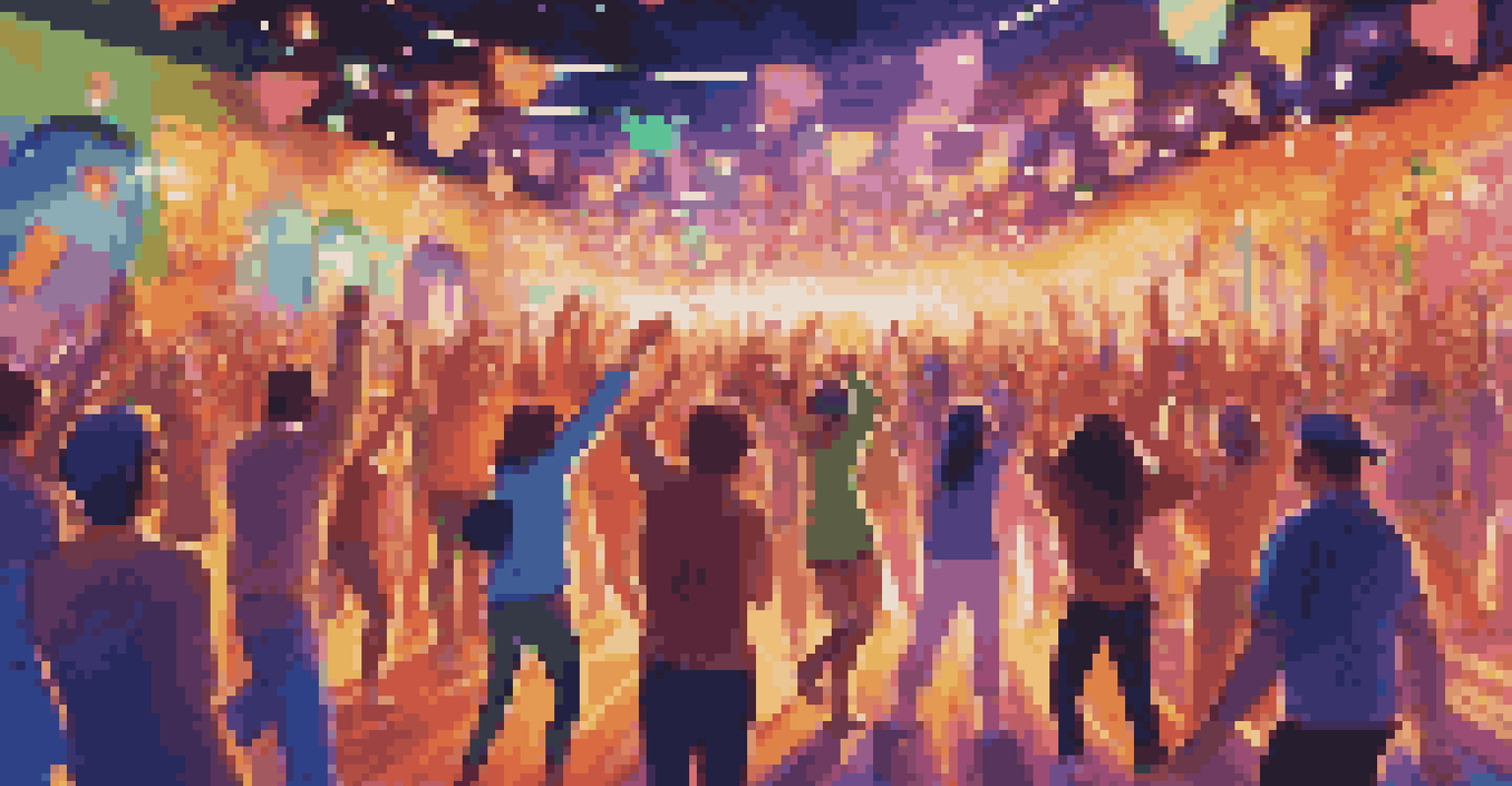How Music Affects Emotional Responses in Virtual Reality

The Science of Music and Emotions
Music has a profound impact on our emotions, often triggering memories and feelings that can transport us to different times and places. This emotional resonance is rooted in the way our brains process sound, where specific frequencies and rhythms can evoke distinct emotional responses. In virtual reality (VR), this connection is amplified, as users are fully immersed in a simulated environment, making them more susceptible to emotional cues.
Music can change the world because it can change people.
For instance, a study found that participants who listened to calming music while engaging in VR experiences reported lower stress levels compared to those who experienced silence. This demonstrates how music can act as a powerful tool for enhancing emotional experiences in immersive environments. By understanding the science behind music's emotional effects, creators can harness its potential in VR applications.
Moreover, the combination of music and visual stimuli in VR creates a multisensory experience that can heighten emotional responses. When users encounter beautiful landscapes paired with uplifting melodies, they are more likely to feel joy and wonder. This synergy between sound and visuals helps deepen the overall impact of the VR experience, making it more memorable.
Creating Atmosphere with Music in VR
In virtual reality, the atmosphere is crucial for setting the emotional tone of an experience. Music plays a vital role in creating this atmosphere, whether it’s through the soft strumming of a guitar in a tranquil environment or the pounding beats of an action sequence. By carefully curating soundtracks, developers can evoke the desired emotions and enhance user engagement.

Consider a horror VR game where eerie music builds tension and suspense. The unsettling soundscape prepares users for jump scares, making their hearts race and heightening fear. Similarly, in a romantic VR setting, soft melodies can foster a sense of intimacy and connection between characters, allowing users to feel more emotionally invested in the narrative.
Music Enhances VR Emotional Impact
Music significantly influences emotional responses in virtual reality, creating immersive experiences that resonate deeply with users.
The key is in the selection of music that resonates with the intended emotional experience. Developers can choose from various genres and styles to find the perfect fit for each scene, ensuring that the atmosphere aligns seamlessly with the visuals. This thoughtful approach to music selection can elevate the VR experience from ordinary to extraordinary.
Music as a Narrative Device in VR
Music can serve as a powerful narrative device in virtual reality, guiding users through a story and enhancing their emotional journey. By strategically placing musical cues at critical moments, developers can signal shifts in tone, create tension, or evoke nostalgia. This technique adds depth to the storytelling, making the experience more immersive and relatable.
The power of music makes all the difference in the way we experience life.
For example, if a character experiences a loss, a sorrowful melody can underscore the emotional weight of the moment, allowing users to empathize with the character’s pain. Conversely, an uplifting score during a victory scene can amplify feelings of triumph and joy. These musical cues become integral to the storytelling, helping to convey emotions that words alone may not fully capture.
Additionally, music can reflect the character's emotional state, providing insight into their thoughts and feelings. This connection between music and narrative creates a more profound experience, allowing users to forge emotional bonds with the characters and the storyline. As a result, the interplay of music and narrative in VR can leave a lasting impression on users.
The Role of User Agency in Musical Experience
User agency, or the ability to make choices within a virtual environment, can significantly influence how music affects emotional responses. When users have control over the music they hear, their emotional engagement with the VR experience can deepen. This allows for a personalized soundtrack that resonates with individual preferences and enhances emotional connections.
Imagine a VR scenario where users can select background music while exploring a serene landscape. Those who choose soothing lullabies may experience relaxation, while others opting for energetic tunes might feel exhilarated. This customization empowers users to curate their emotional experiences, making the VR journey uniquely their own.
User Control Personalizes Experience
Allowing users to select their own music in VR enhances emotional engagement and creates a more personalized journey.
Moreover, the ability to influence the soundtrack can lead to increased immersion. When users feel a sense of ownership over the music, they are more likely to emotionally invest in the experience. This balance of user agency and musical accompaniment creates a dynamic interaction that enriches the overall VR experience.
Cultural Influences on Musical Emotional Responses
Cultural background plays a significant role in how individuals respond emotionally to music in virtual reality. Music often carries cultural connotations that can evoke specific feelings based on a person's experiences and upbringing. Understanding these cultural nuances is essential for developers to create VR experiences that resonate with diverse audiences.
For example, a traditional folk song may evoke nostalgia and warmth for someone from that culture, while it might not have the same impact on someone unfamiliar with it. By incorporating culturally relevant music, developers can enhance emotional engagement and foster a deeper connection with users. This thoughtful approach allows for a more inclusive VR experience.
Additionally, cultural influences can guide the choice of instruments, melodies, and rhythms used in VR soundtracks. By embracing a variety of musical traditions, developers can create richer and more diverse emotional landscapes. This cultural sensitivity not only enhances user experience but also promotes a greater appreciation for different musical heritages.
The Therapeutic Potential of Music in VR
The combination of music and virtual reality holds significant therapeutic potential, particularly in mental health and wellness applications. Music therapy has long been recognized for its ability to alleviate stress, anxiety, and depression, and when paired with VR, these benefits can be amplified. This innovative approach can create safe spaces for users to explore their emotions and work through challenges.
For instance, VR environments featuring calming music can help users practice mindfulness and relaxation techniques. As they immerse themselves in serene landscapes with soothing sounds, they may find it easier to let go of stress and anxiety. This therapeutic use of music in VR can provide individuals with a novel way to manage their mental health.
Cultural Context Shapes Music Perception
Understanding cultural influences on music is essential for developers to create VR experiences that resonate with diverse audiences.
Furthermore, VR experiences can be tailored to address specific emotional needs, whether it's fostering resilience, promoting self-reflection, or enhancing mood. By combining the immersive nature of VR with the emotional power of music, developers have the opportunity to create impactful therapeutic tools that support users on their emotional journeys.
Future Trends: The Evolution of Music in VR
As technology continues to advance, the integration of music in virtual reality is likely to evolve in exciting ways. Innovations such as spatial audio and adaptive soundtracks are already changing how users experience music in VR. These developments allow for a more immersive sound experience, where music responds dynamically to user actions and environmental changes.
For example, spatial audio can create a 360-degree soundscape that makes users feel as if they are truly surrounded by the music. This level of immersion can enhance emotional responses, as users are enveloped in sound rather than just hearing it through speakers. The future of music in VR will likely focus on creating these immersive sound environments that deepen emotional engagement.

Additionally, advancements in artificial intelligence may allow for personalized music experiences that adapt in real-time based on user behavior and emotional state. Imagine a VR experience that changes its soundtrack based on your heart rate or facial expressions. As these technologies continue to develop, the possibilities for enhancing emotional responses through music in VR are limitless.